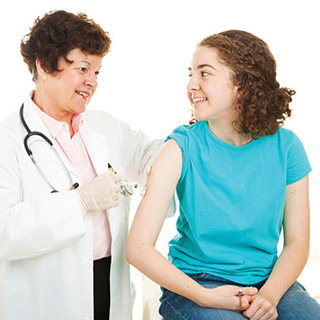Preventing HPV-Related Cancers
The FDA recently approved a new HPV vaccine that could prevent up to 90 percent of cervical cancers in the U.S.

In late 2014, the U.S. Food and Drug Administration (FDA) announced the approval of a new vaccine that prevents infection from five more cancer-causing subtypes of human papillomavirus (HPV) than the first two HPV vaccines approved for use in this country.
Research suggests that the new vaccine – Gardasil 9 – could prevent almost 90 percent of cervical cancer cases worldwide. It also has the potential to prevent more cases of vulvar, vaginal, and anal cancers than the first generation HPV vaccines – Gardasil and Cervarix.
The reason Gardasil 9 has the capability to prevent more cases of cancer than the earlier vaccines is that it protects against five more cancer-causing HPV subtypes – HPV31, -33, -45, -52 and -58 than the existing HPV vaccines.

The FDA approved the new vaccine for the prevention of cervical, vulvar, vaginal, and anal cancers and it is likely that Gardasil 9 could also prevent a significant number of cases of cancers of the oropharynx – the part of the throat just behind the mouth, because more than 50 percent of U.S. cases of these cancers are related to HPV infections. Additional research is needed to show that this is indeed the case.
Of course, Gardasil 9 will only live up to its cancer-preventing promise if those for whom it is recommended – females ages 9-26 and males ages 9-15 – get vaccinated. The latest data from the U.S. Centers for Disease Control and Prevention, however, estimate that just 38 percent of adolescent girls (ages 13-17) and 14 percent of adolescent boys completed a course of an HPV vaccine in 2013.

A study presented in November 2014 at an AACR conference on cancer health disparities found that HPV vaccine uptake among girls is lowest in states with the highest rates of cervical cancer.
A number of recommendations to increase HPV vaccine uptake were made in the most recent President’s Cancer Panel Report, “Accelerating HPV Vaccine Uptake: Urgency for Action to Prevent Cancer,” which was released in February 2014, and there is optimism that we can make progress.
“We can prevent a generation of young Americans from having to go through the same experience I did,” said Bob Margolis, a seven-year survivor of HPV-related cancer and advocate for HPV awareness and vaccination, in the AACR Cancer Progress Report 2014.
